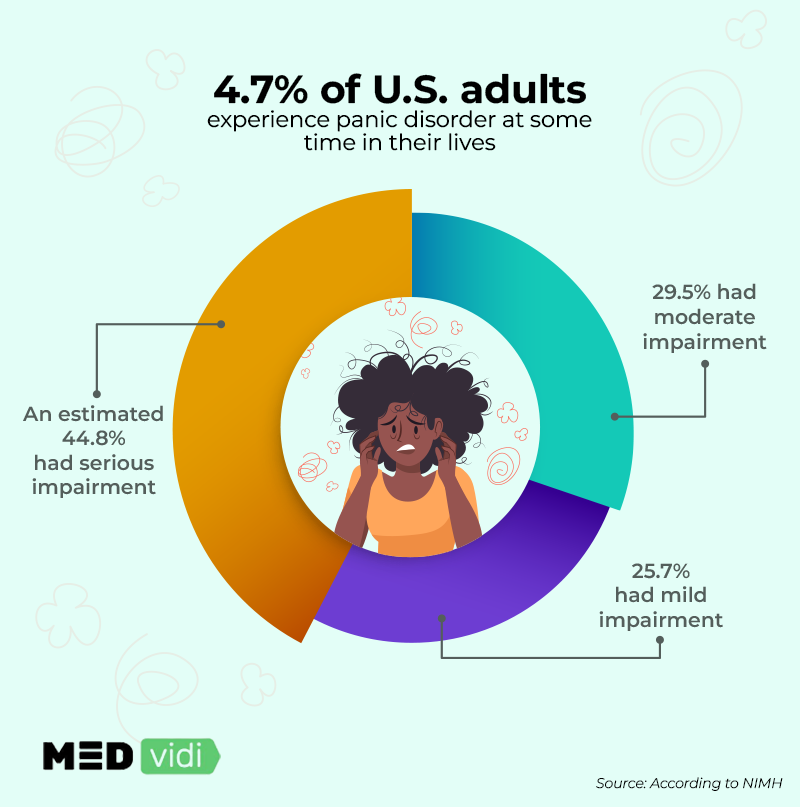Have you ever occasionally experienced onsets of intense panic and anxiety? Most likely, you had a panic attack. In some cases, it is a symptom of a panic disorder.
Panic disorder is a psychiatric condition marked by unexpected anxiety and other somatic and psychological signs. It can induce intense fear that occurs without any obvious reason.
Panic disorder can affect your daily functioning and well-being. So, learn more about the symptoms, causes, and treatment of panic disorder to be more aware of your state.
Are you suffering from distress? Reach out for mental health help from a professional.
Panic Attacks Vs. Panic Disorder
A panic attack is an acute, discrete-time of extreme discomfort, anxiety, or terror that is accompanied by physical and cognitive signs. Repeated panic attacks are a symptom of panic disorder, which is frequently accompanied by worries about upcoming attacks or behavioral adjustments to stay away from potential triggers.
Any anxiety condition may cause panic attacks. For example, a person with a phobia of snakes may panic at seeing a snake. Expected panic attacks occur due to facing similar problematic situations. Unexpected panic attacks are those that happen on their own, seemingly without a cause.
Prevalence of Panic Disorder
Panic disorder is quite a common condition. In the USA, the statistics report that 3.3 percent of men and 7 percent of women may experience episodes of this condition in their lifetime. Overall, panic disorder is thought to affect
Panic Attack: Symptoms
A panic attack is defined by the Diagnostic and Statistical Manual of Mental Disorders (DSM-5) as having at least four of the following symptoms (less than 4 symptoms may be regarded as a limited-symptom panic attack)
- An increased heart rate
- Shaking or trembling
- Sweating
- A feeling of suffocation or difficulty breathing
- A choking sensation
- Chest discomfort or pain
- Vomiting or stomach pain
- Feeling weak and dizzy
- Feelings of derealization or a sense of being cut off from your body (depersonalization)
- Fear of losing control
- The fear of dying
- Feeling of numbness
- Cold sweats or hot flashes
Get your symptoms checked through our Smart symptom checker and get medical diagnosis for anxiety from our professional team.
Diagnosis of Panic Disorder
If you have a panic attack, that doesn’t necessarily mean you have a panic disorder. The DSM-5 lists the following criteria for the diagnosis of this mental condition:
- You get unexpected, recurrent panic attacks.
- At least one panic attack has been followed by a month or more of persistent worry about having another attack.
- A panic attack was followed by an ongoing fear of the negative effects of an attack, such as losing control, experiencing a heart attack, “going crazy,” or having notable behavioral changes, such as avoiding situations that you believe might set off a panic attack again.
- Your panic attacks aren’t brought on by drug or alcohol use, a physical illness, or another mental health issue like obsessive-compulsive disorder or social phobia.
The primary prerequisite for diagnosis is compliance with the DSM’s criteria for panic disorder. In addition, a physical examination and a number of psychological scales or tests may be used to validate the diagnosis.

Panic Disorder Vs. Agoraphobia
Agoraphobia is the fear or worry of being in circumstances from which you feel you cannot escape. When a person experiences a panic attack in a particular place or setting, that may result in agoraphobia.
In previous editions of DSM, agoraphobia was linked with panic disorder. In the new version, DSM-5, agoraphobia is now a codable and separate diagnosis. Additionally, it says that avoidance behaviors need to be displayed to get such a diagnosis. These mean worries about encountering anxious or panicky circumstances in which support might not be available, or escape might be challenging.
Only a mental health professional can diagnose you with a condition based on your symptoms.
What Causes Panic Attacks?
Although the exact cause of panic attacks or panic disorder is unknown, the following factors might be involved:
- Stress
- Genetics
- Being sensitive to stress (personality characteristic)
- Changes in the way your brain functions
- Existing mental health conditions such as depression, PTSD, or anxiety
- Lack of self-esteem
Treatment for Panic Disorder
Several treatment options are available for the treatment of the panic disorder. A thorough evaluation by the doctor and discussion with the patient help determine the best course of treatment for a particular person.
Medication
To decrease the physical side effects of your attacks, your doctor could decide that medication should be a part of your treatment. For instance, it might be one of the initial steps.
They might suggest antidepressants (the first line of defense against future panic attacks) or benzodiazepines (a type of prescription anti-anxiety medication). Doctors may prescribe additional drugs for patients with substance use problems.
Commonly prescribed medicines for panic attacks include the following:
- Alprazolam (Xanax) — Benzodiazepine, used for short-term treatment.
- Citalopram (Celexa) — SSRI, can be used for long-term treatment.
- Sertraline (Zoloft) — SSRI, can be used for long-term treatment.
Therapy
Speaking with a mental health professional about your anxiety may be beneficial if you frequently experience panic attacks. This is especially necessary if your activities are restricted by your fear of having an attack.
There are numerous forms of therapies that can be used to treat anxiety and any underlying problems. For instance:
- Cognitive-behavioral therapy (CBT) to better understand the actions and thought patterns that may contribute to the onset of an attack. A person can adjust these patterns to help prevent attacks and lessen their intensity by using CBT.
- A type of therapy called exposure therapy involves gradually exposing the patient to each of the physical symptoms of panic in a safe setting so they can learn effective coping mechanisms.
- Some people could find benefits in joining support groups for the management of panic attacks. You could find inspiration from others who have begun to treat their anxiety. You might learn advice or skills that assist you in handling your condition.
How to Get Help?
A balanced diet and regular exercise can help reduce your risk of having a panic attack. However, if the symptoms have started developing, recovering from panic disorder can be challenging, if not impossible, without outside assistance. That is why finding treatment for panic disorder for you or a loved one is crucial.
To talk about your choices for treating panic disorder, get in touch with MEDvidi. You can start making an action plan to stop your worry, fear, and panic attacks right now and feel free from anxiety.












